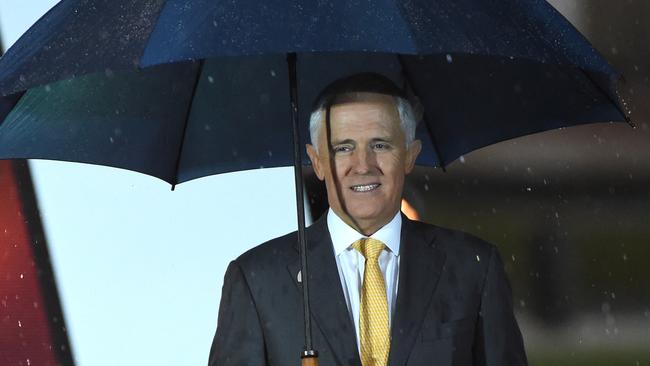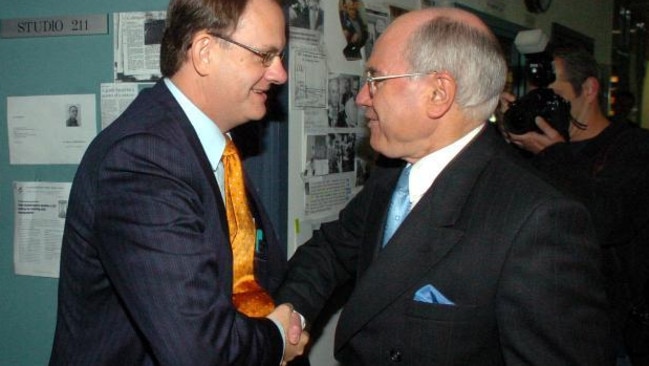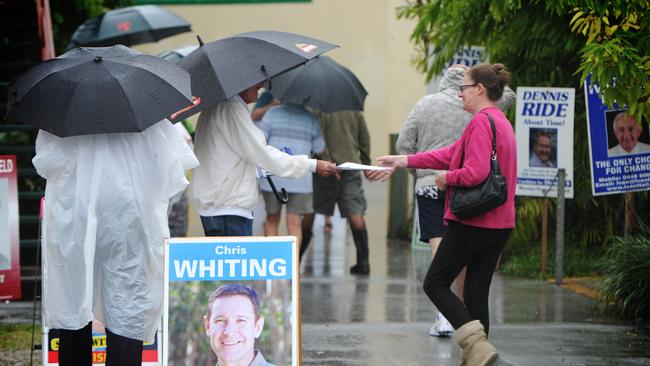He’d like it to rain on your voting day. Ironic, don’t you think?
MALCOLM Turnbull would like it to rain on your voting day. Literally. Because forget what the pundits say, the darnedest things determine your vote.

WE COULD be lining up for our election sausage sizzle in cold rain, if Prime Minister Malcolm Turnbull has his way.
Mr Turnbull is talking about a winter election. This is very clever. Holding an election in August may get more people to vote for him.
Weather affects the way people vote, and research shows grim weather encourages people to make “safe” choices, like sticking with the current government.
Political pundits like to make up reasons, but political careers are won and lost on some really random events.
For example, in US Democratic primaries this week they used coin tosses when things got close. Hillary Clinton got a fair run of luck but it could have gone the other way and delivered extra state delegates to her opponent.
For more evidence of political luck, please consider this obituary of a NSW MP who got his first ministerial appointment after his name was drawn from a hat.
But randomness is uncomfortable for the human mind. If we’re asked to mimic a random pattern we spread things out evenly. And we tend to make wrong judgments about whether a coin flip will turn out tails next time if it has landed tails six times in a row.
The human mind prefers ‘narratives’ over randomness. In politics, this means people change their reading of the past to suit the present. It is especially obvious when political pundits do it.
For example, these days, serious political journalists argue former Labor leader Mark Latham was always “a loose unit” and never a chance of becoming prime minister. The idea nobody seriously considered voting for him is hard to reconcile with the fact Labor was leading the polls for most of 2004, until a bombing in Jakarta.

Similarly, the preferred narrative is that prime minister John Howard was a political genius in touch with the people. Despite the facts he won his elections mostly narrowly, taking all the benefits of random events like September 11 to do so, before eventually losing government catastrophically and his seat in the process.
No political pundit is going to get paid to say “the outcome of the election was decided by unpredictable random factors” — even if that is the case.
You see the same with the sharemarket. “Positive investor sentiment drove the sharemarket up today,” the finance reporter says. (OK, I admit, I have written that myself!)
What the finance reporter means is the sharemarket went up, but we don’t understand why.
(In fact, every night’s sharemarket news could be this: “The number of shares bought equalled the number of shares sold today. Prices fluctuated in a way nobody could fully predict or explain.”)
But back to politics.
As well as weather, people vote for candidates on the basis of changes in their own wellbeing. If things are going badly, they demand change. Sometimes, those changes have nothing to do with politicians.
The most famous case is a series of four fatal shark attacks in New Jersey in early July 1916, which caused a media frenzy, and loosed a storm of votes against US President Woodrow Wilson in the next election.
Mr Wilson could hardly have been expected to prevent the shark attacks, but he bore the blame.
Economic trends behave similarly. Mr Turnbull can expect his vote to rise if petrol is cheaper. But his majority could slide if global financial markets are still in turmoil. Neither of these can be controlled from his office.
So when the election is won and lost and pundits are toasting the genius of Mr Turnbull and bemoaning the insipidness of Mr Shorten (or perhaps the reverse!), remember the stories they tell are like fairytales. Made-up explanations for far more complex phenomena.
Don’t believe a pundit who tells you the sun shines out of a politician’s behind. The real reason they won may be because the sun wasn’t shining at all.

Jason Murphy is an economist. He publishes the blog Thomas The Think Engine.
Follow him on Twitter @jasemurphy.




